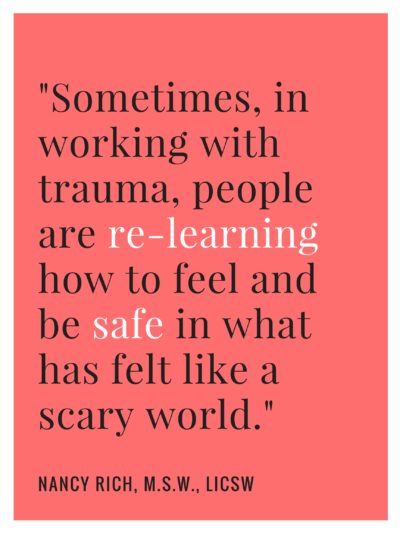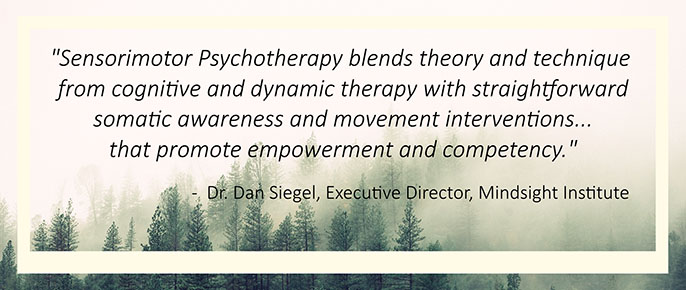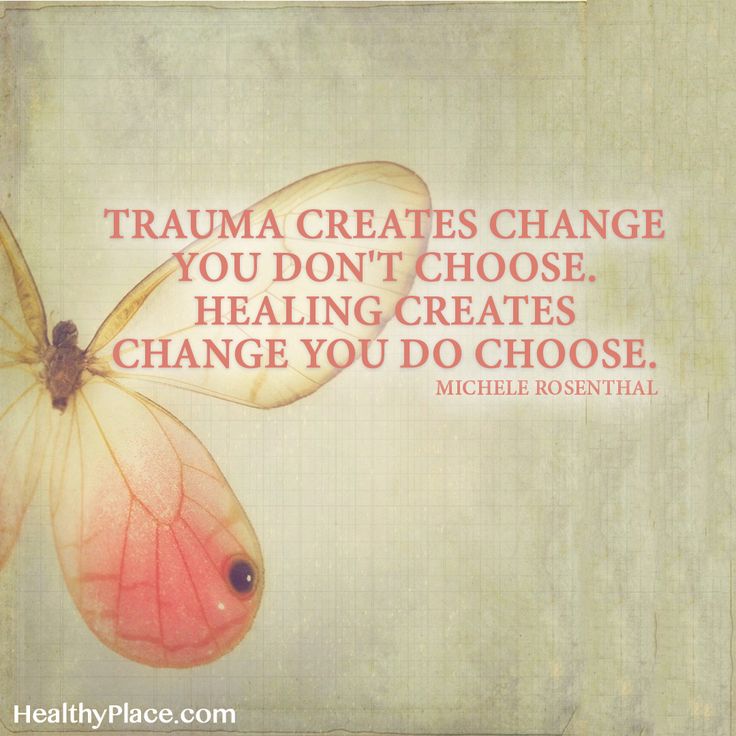Written by Nancy Rich, M.S.W., LICSW
What is trauma?
Trauma can be defined in many ways. Part of the definition therapists use is: a person was exposed to death, threatened death, actual or threatened serious injury, or actual or threatened sexual violence. When you are a therapist and work in the front lines, you typically get a sense of when someone has been through trauma. People often think of Posttraumatic Stress Disorder (PTSD) as a struggle only combat soldiers have, or maybe a car accident, but most of my clients over the past 7 years have been people who are exposed to chronic control, manipulation, neglect and abuse from childhood. I also work with those who have had repeated betrayals and abandonment; although not all would fit the criteria for PTSD, often times the course of treatment is very similar in treating trauma.
More research is coming out about trauma; including how it impacts the brain and a person’s neurobiology. When a person is triggered and having a traumatic response, the nervous system is “revved up,” the emotional center of the brain is sending out alarms to the body, and a person can feel completely out of control. During this time what is called the “thinking brain,” also known as our prefrontal cortex is “shut down,” denying people access to fully think through a situation logically and to know they are completely safe in the here and now. Their bodies and brains are not in the here and now; it is in the trauma. So you can already see how a person is going to need a full person approach, understanding a person’s biology as well as how trauma impacts their soul (mind, will, and emotions) and spirit (if you are integrating spirituality or even mindfulness approaches).

When you think about a child being exposed to trauma, let’s say during childhood, in their family system, you are now looking at how trauma is impacting their ability to have relationships, to maintain healthy boundaries (knowing when to say yes and when to say no), discerning whether or not a situation or person is safe, and being able to tolerate peace and good things (as opposed to chaos and a constant feeling that something bad will happen). Sometimes in working with trauma, people are re-learning how to feel and be safe in what has felt like a scary world. Other times you are teaching them how to be mindful, fully present in the moment. Other times you are really focusing on how they do relationships and helping them be nourished by healthy relationships. Sometimes you are going straight to the memory and doing more intensive work to remove what seems like a wound in their soul, an infection that needs to be removed. Other times you are helping them rebuild an identity that isn’t solely defined by the trauma(s) they have been through. And through all of this, you are helping reinforce the prefrontal cortex, the “thinking brain,” strengthening their responses to align with how a healthy adult would respond as opposed to the “scared child” or the “angry teen.”

Trauma Treatment
There is hope and great treatment for trauma. There is actually more research coming out saying that the brain can and does change with treating trauma. We can “wake up” the thinking brain in the face of triggers. Through different methods, such as Sensorimotor psychotherapy and EMDR (Eye Movement Desensitization Reprocessing), trauma symptoms can and do improve. I have seen many people be transformed through these treatments and through taking baby steps each and every week. Sometimes we think of healing and recovery as a dramatic moment, but often times it’s in the consistent, mundane steps taken each day by clients. Maybe it’s a mindful breath, writing feelings down, asking God to come and help, not turning towards food or alcohol to numb emotions, but to allow yourself to feel, or maybe it’s trusting a safe person and allowing them to love you in your brokenness. There is power in the consistent, small steps taken towards healing.

Spiritual Integration
For those who are interested in integrating spirituality, there is much power in that, and I have found it can accelerate someone’s recovery and healing process. God doesn’t come in and fix all of our problems, but He does empower each step taken. There is also a clear path He can set before clients, letting them know what memory to work through, which direction to go, and when to stop. For those who are interested, Jesus can also be a powerful Healing Source, especially in memory work. There are certain wounds, especially the wounds from either father or mother that other people cannot heal. There can be powerful and healing encounters with Immanuel, “God with us.” Many clients I have seen have been very wounded by religious institutions and have a very mixed up view of who God is; there are also tools to address that, if the person is willing. However, some people are not ready to go there and want to keep a distance between their therapy and any type of religion and spirituality, and there also gets to be plenty of space for that.
To anyone who is experiencing traumatic reactions in their life, I would encourage you to begin to understand your patterns. Learn and grow in understanding how trauma impacts you. It can be very empowering knowing you are not making this stuff up or going crazy. You are having perfectly normal reactions to trauma.

I find it an honor to work alongside those who have experienced trauma and my hope is that each person is fully restored and mended to become all they are created to be. A mended relationship with the body, soul, and spirit, succinctly working together to walk in abundance is our vision for those who come to Water’s Edge Counseling & Healing Center.






